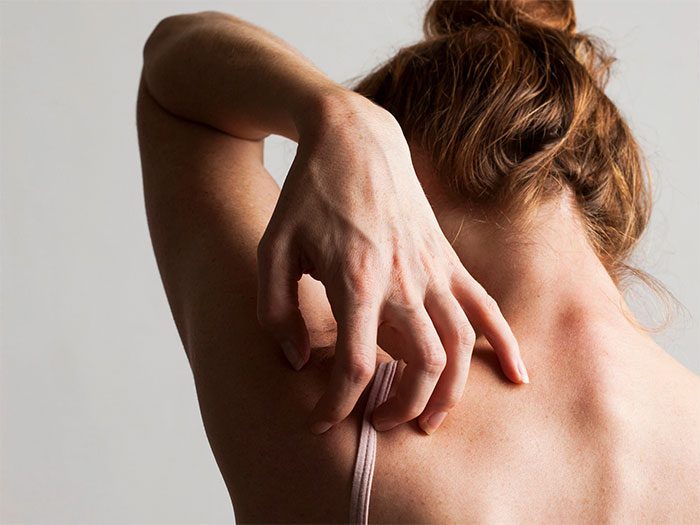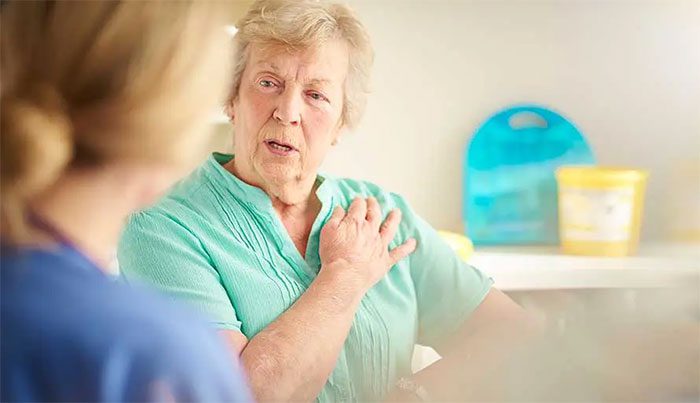Accurately identifying the causes of itching in the lungs can help you take preventive measures or recognize symptoms that require early medical intervention.
What is Lung Itch?
1. What is the sensation of itching in the lungs?
The sensation of itching in the lungs may be caused by an underlying medical condition or exposure to environmental irritants or stress. Certain health conditions, such as asthma, can exacerbate this reaction.
Here are some potential causes of lung itching that you might consider:
- Environmental causes include: Dry, cold air; poor air quality; cigarette smoke or emissions from vehicles; fumes from sources like household cleaners, pesticides, or industrial chemicals,…

There are many causes of lung itching. (Image: Internet).
- Medical causes of lung itching include: Allergies to dust, pollen, pet dander, cockroaches, and mold; asthma; infectious agents attacking the respiratory system, such as the common cold; side effects from certain medications like non-steroidal anti-inflammatory drugs (aspirin, ibuprofen, naproxen),…
- Physical and psychological causes include: Stress; excessive strain; chronic irritability;…
2. What are the symptoms that occur with lung itching?
Lung itching often develops alongside other respiratory symptoms. All symptoms will vary depending on the underlying cause or general condition.
The sensation of itching in the lungs may occur with other symptoms, such as:
- Allergy symptoms include: Sneezing, itchy eyes, facial swelling, runny nose, post-nasal drip.
- Asthma symptoms include: Wheezing; coughing, especially at night, while laughing, or during exercise; chest tightness or pain; shortness of breath or feeling breathless; difficulty sleeping.
- Respiratory illness symptoms include: Coughing; sore throat, body aches; headaches; fever.
It is important to distinguish between sensations that can be confused with lung itching, such as chest tightness or increased respiratory secretions. However, symptoms are subjective experiences and will differ from person to person.

Lung itching may accompany other symptoms. (Image: Internet).
3. Treatment for itching in the lungs
Treatment for lung itching will begin by identifying the underlying cause and eliminating it. If the cause is unclear, it’s time to see a doctor for an appropriate diagnosis.
Treatment for lung itching due to environmental factors
Those with allergies should avoid allergens. This may include pollen, mold, and smoke. Pollen travels through the air and is inhaled into the lungs. Here are some steps to take:
- Limit opening windows during the day.
- Shower and wash clothes after working or coming indoors from outside.
- Avoid hanging clothes, blankets, and bedding outside during pollen season or in polluted environments.
- Wear sunglasses, protective eyewear, or other throat-nasal protection to avoid exposure to environmental irritants.
To prevent mold from growing in your home, regularly clean your space and maintain indoor humidity levels between 30-50%.
If cigarette smoke is causing lung itching, limit exposure to smoke as much as possible or quit smoking to gain many positive health benefits.
Treatment for lung itching due to medical conditions
Individuals with asthma, bronchitis, or other medical conditions that lead to lung itching should consult a doctor, follow prescribed treatments, and attend regular check-ups. Treatments typically include medications, inhalers, rest,… Adhering to your doctor’s recommendations will help treat the cause and assist in managing and preventing future issues.

The treatment for lung itching will vary depending on the cause. (Image: Internet).
Treatment for lung itching due to physical and psychological factors
To alleviate the sensation of lung itching due to psychological factors, adopting stress management techniques such as meditation, deep breathing, regular exercise, lifestyle changes, or speaking with a psychologist plays a crucial role.
If cold, dry air is causing your lungs to feel itchy, wearing a mask or other protective equipment while exercising can make you feel more comfortable.
When should you see a doctor for lung itching?
If the sensation of lung itching does not improve or worsens over time, accompanied by other symptoms, it may indicate an underlying negative issue. You need to see a doctor promptly for diagnosis and appropriate intervention. Avoid applying unproven folk remedies for lung itching, as this may complicate treatment or lead to unwanted side effects for your health.


















































